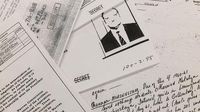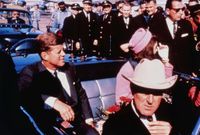The Trump administration's recent release of over 2,000 files related to the assassination of former President John F. Kennedy has sparked renewed interest and debate surrounding the infamous event.
On March 18, 2025, the National Archives published more than 60,000 pages of documents, shedding light on the circumstances surrounding Kennedy's death, which occurred in Dallas, Texas, on November 22, 1963. The shooting was orchestrated by Lee Harvey Oswald, a former U.S. Marine, who shot Kennedy from the Texas School Book Depository.
Oswald was later killed two days afterward by nightclub owner Jack Ruby. Following the assassination, President Lyndon B. Johnson established the Warren Commission, which concluded in 1964 that Oswald acted alone, a finding that has been met with skepticism by many Americans over the decades. A 2023 Gallup poll found that 65 percent of Americans still reject the Warren Commission's conclusion.
Despite the release of new files, experts have indicated that they do not support the notion that Oswald had accomplices. “I didn’t really see anything to change the narrative indicating that Oswald as the lone gunman was the person who killed John F. Kennedy and that it was not the result of a conspiracy,” noted Marc Selverstone, a professor in presidential studies at the University of Virginia. He emphasized that the documents provided insights that were only tangentially related to the assassination itself.
Among the revelations from the recent document dump is confirmation that Oswald visited both the Soviet and Cuban embassies in Mexico City shortly before the assassination. He had moved to the Soviet Union in 1959, where he defected and later renounced his U.S. citizenship before returning to the States in 1962. The documents also revealed intelligence about Oswald's shooting abilities, with reports suggesting he might have been a poor shot.
Furthermore, the released documents detailed various operations regarding U.S. intelligence and foreign policies during the Cold War era. This included information on a campaign called “Operation Mongoose,” which aimed to destabilize Cuba, as well as intelligence communications related to attempts to overthrow Fidel Castro. A CIA memo also disclosed assassination plots against leaders like Dominican Republic President Rafael Trujillo, who was murdered in 1961.
While the Trump administration claimed this release represents a commitment to transparency, it has not been without controversy. Critics pointed out that more than 200 individuals' Social Security numbers were inadvertently revealed in the files, prompting significant backlash. Joseph diGenova, a former Trump campaign lawyer whose information was included, described the incident as “absolutely outrageous” and criticized the administration for its negligence, citing risks of identity theft as a serious concern.
The release generated further disappointment when many expected that it would shed new light on the conspiracy theories surrounding JFK's assassination. Expert opinion so far suggests that no new evidence has emerged that would challenge the established conclusion that Oswald acted alone. “In the documents, I'm not hearing about anything yet that’s sort of earth-shaking,” stated Barrett, pointing to the lack of significant new findings.
As the evidence stands, public belief in conspiracy theories persists, with a Gallup poll revealing that around 20 percent of participants believed Oswald conspired with the U.S. government to kill Kennedy, while 16 percent suspected he worked alongside the CIA.
This latest release is part of an ongoing effort to provide access to public records. Prior to this document dump, over 99 percent of the approximately 320,000 documents reviewed under the 1992 JFK Records Act had already been released. Several rounds of document releases have occurred since then, with President Trump claiming to uphold promises of transparency.
However, many documents released under Trump have faced criticism for being too controlled, with only a small circle of conservative influencers receiving access to some earlier documents. Still, experts largely view these latest files as a positive step toward openness in government. “I think it’s a very good thing for transparency. The U.S. government finally, very belatedly, released these documents,” Barrett stated.
In the fallout of this latest release, the focus will likely remain on evaluating how these documents reshape the narrative surrounding JFK's assassination and whether further discoveries will emerge in the ongoing inquiry into the events taking place around that fateful day in November 1963.






